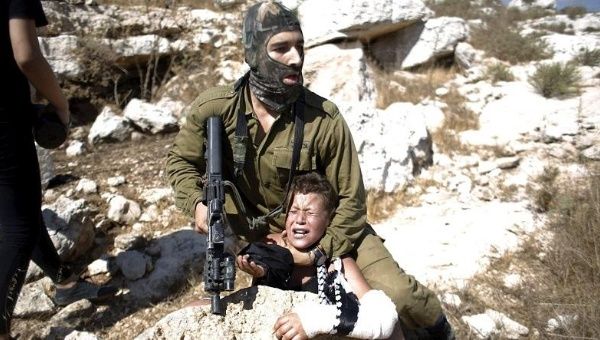Originally published by Green Left Weekly, December 4.

Israel has detained at least 1200 children since October 1.
As the latest upsurge in mass Palestinian resistance to Israel's occupation entered its third month, the world marked the International Day of Solidarity with the Palestinian People on November 29.
The date marks the UN's recognition of Palestine as a non-member observer state in 2012, as well as the adoption of the original UN partition plan in 1947, that divided Palestine into two states.
Governments and international bodies around the world took the opportunity to express solidarity with the Palestinian people. Yet there are no signs that the self-styled “international community” — in reality, the Western imperialist countries and their allies — are making the radical shift away from supporting Israel's crimes that true solidarity would entail.
The day before, the Palestinian Liberation Organisation (PLO) issued a damning statement announcing the number of Palestinians arrested by the occupying forces since October 1 had reached 2400 — half of them children under 18.
The death toll from the recent violence is 104 Palestinians, 21 Israelis, one American and one Eritrean, Al Jazeera reported on November 30.
The death of Palestinians have been obfuscated by Israel's propaganda machine, with victims slandered as "stone throwers" or "knife attackers".
Extrajudicial killings
An example of this was the murder of Ashraqat Taha Ahmad Qatanani, 16 years old, at Huwarra checkpoint on November 22. She was run over by a prominent Israeli settler, Gershon Mesika, whose car ran off the road after striking Qatanani.
He alleged, without any evidence, she was about to attempt a stabbing of Israelis waiting at the checkpoint's bus stop. “I didn't think twice: I stepped on the gas,” he told Arutz Sheva that day. Arutz Sheva dubbed Mesika a "hero civilian" who "thwarted a stabbing".
After Mesika ran her down, nearby soldiers shot the wounded teenager, who died at the scene.
Israeli Prime Minister Benjamin Netanyahu, who visited the US in November, took the opportunity to press Barack Obama's government to recognise the illegal settlements built on Palestinian land in the West Bank, Haaretz reported on November 24.
Internet access
Meanwhile, the Israeli government has finally allowed for West Bank Palestinians to access 3G mobile internet infrastructure, with an agreement signed by Israel's Army Coordinator Yoav Mordachai and Palestine's Minister for Civil Affairs Hussein al-Sheikh on November 19.
Mamoun Mattar, a Palestinian IT and broadcasting expert, told Al Jazeera on November 29: “I am not sure it is that advantageous now to go to 3G while all surrounding countries are using 4G and are preparing for 5G.”
He said Israel had only allowed the concession as they had already upgraded their network to 4G, leaving the frequencies vacant. However, communication will still be restricted — and Gazan Palestinians won't be granted access to 3G at all.
BDS backlash
The strongest international responses to the latest wave of oppression have been through the movement for Boycott, Divestment and Sanctions (BDS). Some important BDS campaigns have come to fruition.
The American Anthropological Association overwhelmingly voted to support boycotting Israeli academic institutions on November 20, joining a number of United States academic bodies which have supported the academic boycott in recent years.
Campaign group Anthropologists for the Boycott of Israeli Academic Institutions declared the victory “a historic day for the Association, affirming the finest anti-colonial, anti-racist traditions within the discipline of anthropology.”
And while it falls far short of full BDS against Israel, the European Union's decision to mandate all Israeli settlement goods be clearly labelled on November 11 poses a real threat to Israel's attempts to annex the West Bank by stealth through ever-expanding settlements.
Hysteria over BDS
The decision has resulted in hysteria in Israel, with Netanyahu responding that the decision “brings back dark memories”, alluding to the boycott of Jewish businesses during the 1930s. Other Israeli government ministers repeated the clichéd denunciations of “disguised anti-Semitism”.
Netanyahu even announced on November 29, International Day of Solidarity with the Palestinian People, that Israel would unilaterally suspend the European Union from peace talks between Israel and Palestine.
Hysteria over BDS has even led Israel's parliament, the Knesset, to pass the initial reading of a law that would “bar anyone who publicly calls to boycott Israel or part of Israel from entering the country.” Lawmaker MK Yinon Magal said, “Anyone who wants to boycott is welcome to do so from Syria.”
The Israeli hysteria over BDS, or even partial measures like the EU's settlement labelling decisions, is an indication that international solidarity with Palestine can be effective.
Israeli military companies have recently begun to feel the impact, with their exports last year falling to just 53% of their 2012 peak, prompting Israel's four biggest arms dealers to write a letter warning Netanyahu of a “major crisis”.
But the Australian subsidiary Israeli arms dealer Elbit, which was targeted by BDS protesters in 2014, hopes to kick-start their faltering exports with a new joint bid with Australian manufacturer Elphinstone Group to build 225 Sentinel II vehicles for the Australian Defence Forces (ADF).
This should be the focus of protests.
